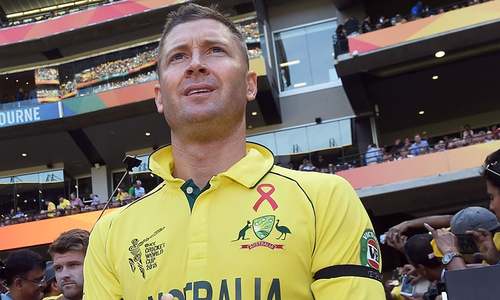MELBOURNE: Australia's cricket board will make it compulsory for players to wear helmets when facing fast and medium-paced bowling in line with recommendations from a review into the death of test batsman Phillip Hughes.
Wicketkeepers and players fielding close to the wicket will also have to wear helmets in first class matches in accordance with the David Curtain review, which was released on Wednesday.
The helmets, mandatory in games and during practice, must adhere to the highest British standard, Cricket Australia (CA) said.
Hughes was struck on the back of the head by a rising delivery when batting for South Australia in a domestic match in November 2014.
He died two days later in a Sydney hospital aged 25.
“There's not a day that goes by where we don't think of Phillip,” CA boss James Sutherland told reporters at the Melbourne Cricket Ground on Wednesday.
“This report won't bring him back and it won't do anything to ease the pain of his family or his loved ones who miss him most.
“But we have a responsibility and a duty to ensure nothing like this ever happens again.”
Hughes's death shocked the cricketing world and ignited a debate about safety standards, particularly for batsmen, who face fast bowling that can exceed 150 kilometres per hour (93 mph).
Hughes was wearing an Australian standard helmet when he was struck, but the Curtain report said even the newer British standard helmet available at the time would not have afforded him extra protection from the blow.
The report also said an apparent delay in the arrival of the ambulance team that treated Hughes played no part in his death.
“I am of the opinion the attention received by Phillip after being struck had no role whatsoever on his subsequent demise, due to the nature and severity of his injury,” it said.
The report also recommended wicketkeepers play with protective eye-wear but stopped short of endorsing the clip-on neck guards on the back of helmets, which some players have worn after Hughes's death.
Sutherland said CA still encouraged players to wear the guards but conceded, like the report, that more research was required to determine whether they actually increased safety.
“We're certainly taking up the running on that to make sure we understand it better,” he said.
Sutherland said the board had also sought approval from the International Cricket Council to trial the use of injury substitutes who could bat and bowl in domestic games.
Substitutes have been permitted to replace injured or ill players in matches for over 100 years but are not allowed to bat, bowl or act as wicketkeepers or captains, according to the laws of the game.
Initially the substitutes would replace players ruled out by concussion but in future their use could be expanded to include other forms of injury, Sutherland added.















































Dear visitor, the comments section is undergoing an overhaul and will return soon.